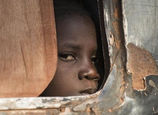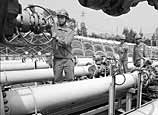
However, knowing her disease is fatal, Lyu felt it was important to have a child to keep her husband company after she dies. "The child will make our family complete like all other families, and this is the happiest thing I can think of."
The couple met in an online chat room in 2009. Luo, a native of south China's Guangxi Zhuang Autonomous Region, was working in a chemical plant in Hangzhou, capital of coastal Zhejiang Province.
They married in 2011, despite the objections of Lyu's parents, who believe their daughter's very existence is a miracle.
When Lyu was 12 weeks pregnant, she was given a DNA test that included amniocentesis, a process in which doctors test the fluid surrounding the fetus to determine whether the ALS gene can be passed on to the child.
The test results were negative and subsequent prenatal checks have indicated a healthy fetus.
The couple's plight has been covered by Chinese newspapers and TV stations, arousing widespread attention. Many web users have offered a helping hand, either by donating cash or contacting hospitals on the couple's behalf.
They have very little money saved and no idea how much the delivery will cost.
Lyu's father is partially blind and her mother earns just 500 yuan (about 80 U.S. dollars) a month as a janitor. Lyu has two younger brothers, one of whom is also an ALS patient. Her other brother is still in junior high school.
There are currently about 200,000 ALS patients in China. Since treatment is expensive and not covered by most social welfare programs, many are forced to forego care.
ALS strikes one to three people in every 100,000. Patients progressively lose muscle strength, eventually becoming paralyzed and unable to speak, move, swallow or breathe. British scientist Stephen Hawking is one of the more famous people with the disease.

















 Living in Beijing on monthly income of 10,000 yuan
Living in Beijing on monthly income of 10,000 yuan


![]()
